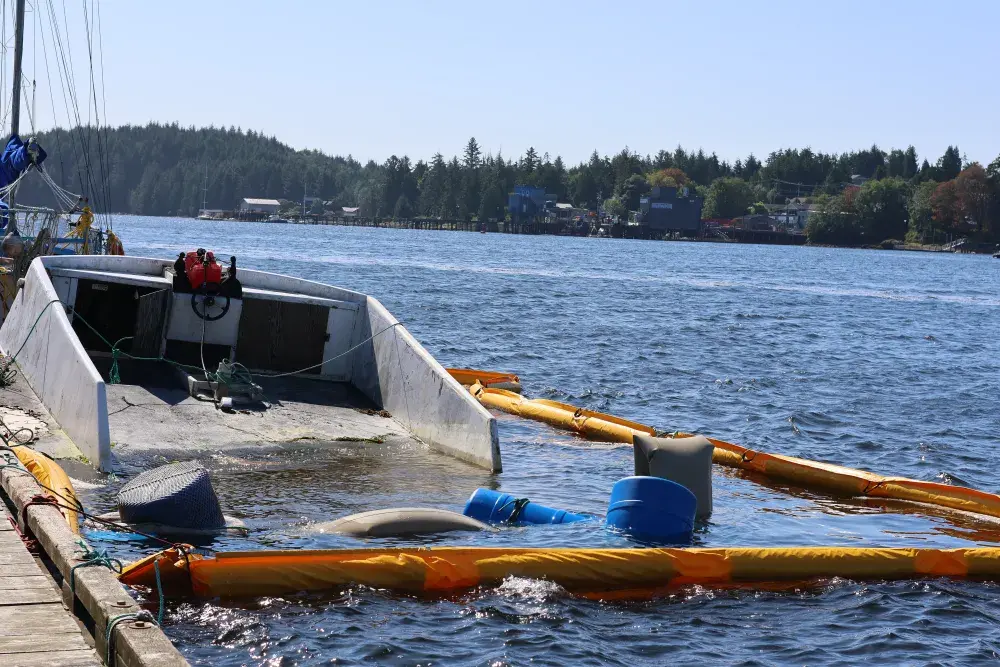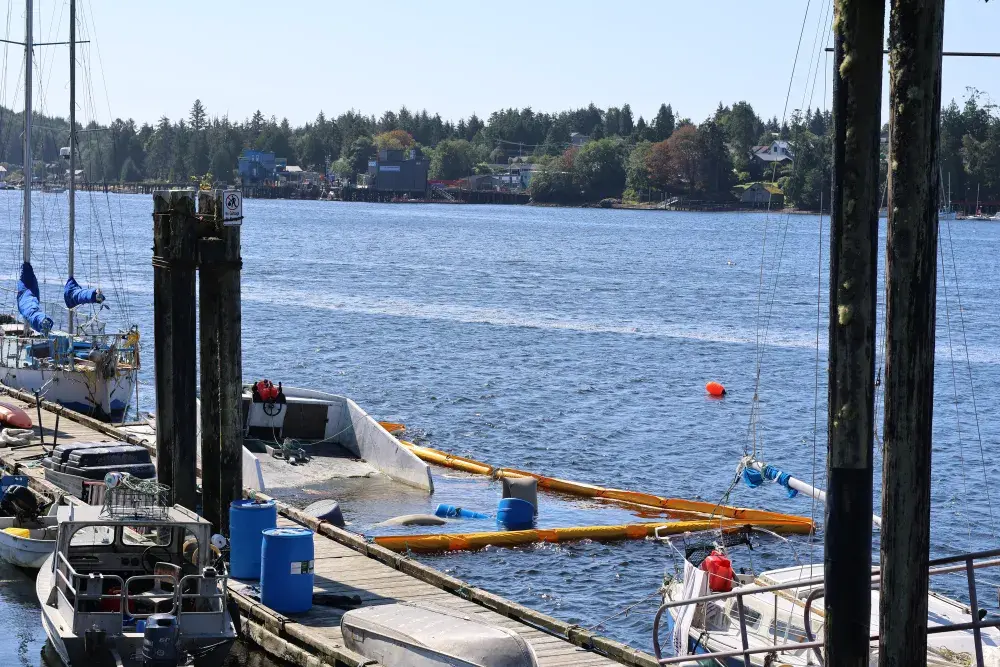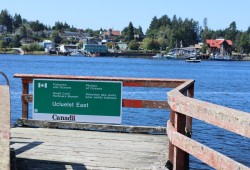A recent diesel and oil spill from a sinking vessel in the Ucluelet harbour has triggered alarm bells amongst locals about Canada’s response process.
On Aug. 6 at about 10:30 p.m., Gerry Schreiber called the Canadian Coast Guard (CCG) emergency response line to report oil leaking from a vessel at the Ucluelet East government dock in Port Albion.
“I said, ‘You gotta get your guys out here. The oil is pouring out of this thing’,” Schreiber told the Ha-Shilth-Sa, adding that two other locals reported the spill as well.
Schreiber says the response he received from CCG was, “it’s dark, we can’t do anything at night.”
“It wasn’t stormy. The tide was turning and there was a lot of oil coming out,” Schreiber continued. “Why aren’t they responding? They knew within half an hour that this was going down and they did nothing. Why?”
The CCG crew from the Bamfield Lifeboat station arrived on scene at about 10 a.m. the next morning, roughly 12 hours after Schreiber’s emergency call was placed. Depending on the vessel, Bamfield is about a 2.5 to three-hour journey to Ucluelet.
In a written statement, the CCG says a “light, non-recoverable sheen was observed, but there had not been a significant release of fuel from the vessel”.
Dane Stabel, a marine biologist and scientific diver, lives in Stewart Bay located at the mouth of the Ucluelet harbour.
“I noticed diesel all out the mouth of the harbour the next morning around 9 a.m. The tide pretty much pulled it out this way. You could smell it. I didn’t notice it coming onto the beach, thankfully,” said Stabel.
“Just directly across from that dock are the very expensive orange and blue spill response boats that we have up and down the coast. I know they are full of gear and ready to go, so I’m wondering why they didn’t respond,” Stabel adds.
Western Canada Marine Response Corporation (WCMRC), an industry-funded organization established to respond to marine oil spills, has a mini-barge and a boom-skiff permanently stationed in Ucluelet about 200 metres from where the Aug. 6 diesel spill took place.
WCMRC also keeps a 53-foot equipment trailer (with 5,000 feet of boom) and two small boom trailers (for a total of 9,000 feet of boom) permanently stationed in Ucluelet.
CCG did not call WCMRC to help with the spill.
“It’s not that we weren’t able or interested or available to respond to that spill, it’s just because of how the legislation works because we weren’t activated, we weren’t involved in the response,” said WCMRC senior manager of communications Michael Lowry from their Burnaby head office.
Canada’s spill response regime is a partnership between the federal government and industry, built on the polluter-pay principle. Any vessel over 400 gross tonnes or any oil-carrying-vessel over 150 gross tonnes by law must have a membership with WCMRC and by law must activate WCMRC to respond in the event of a spill, according to Lowry. CCG can also activate WCMRC to respond.
“If there was a large spill from a commercial vessel, that commercial vessel is going to activate us,” said Lowry.
Over the past decade, WCMRC invested $170 million in new equipment and new response bases to support the significant increase in oil tanker traffic driven by the Trans Mountain expansion project.
“I can understand why it can be frustrating for the community to see that these assets are there and sometimes they are not used in particular responses, but we are there for those large-scale situations. That’s primarily what we are designed for,” Lowry said. “The idea is that the Coast Guard can handle smaller spills and they can activate us if they want. I know our crews would love to be involved in the smaller spills as well.”
CCG say they hired a local contractor by Aug. 10 to “regularly check the status of the vessel and the containment boom for any releases of pollution.”
Ucluelet Aquarium curator Laura Griffith-Cochrane says by then “the damage has been done.”
“For me, I feel the responsibility of care for all of the animals that are in the aquarium, and I also feel the responsibility to our staff and our community that we’re providing a safe place for people to come into to interact with animals,” said Griffith-Cochrane.
“The highways aren’t under construction these days. For me, the spill response time is under two hours. Call people out from Port Alberni,” she said.
Stabel echoes the sentiment.
“There was a lot of time deciding who is responsible for it and whose jurisdiction it is, and that’s the time when it’s crucial to get booms (in the water) and contain the spill. I would have liked to see something a little quicker,” he said.
Ahousaht First Nation’s Kurt John is part of the Coastal Nations Coast Guard Auxiliary. He said he was surprised CCG didn’t hand it over to Ucluelet’s harbour master or someone else local that could assess it faster.
“It’s a no brainer for us. If something happens in our harbour, we are going to respond to it anyway. We have the booms stored in our harbour,” said John.
He added that they also report incidents to CCG, who in turn notify CCG Marine Environmental Response, who then would call Ahousaht Harbour Authority, which takes them back to John since he’s the harbour master.
“It’s like passing the baton,” John said. “If you’re having a coffee and you accidentally knock it over, you’re not just going to let it sit there. If someone else spills their coffee, you will probably help that person and replace their coffee.”
If there were people in the sinking vessel and lives were at risk, John says the CCG would have been there right away.
“We are always thinking safety first. You are not going to risk three or four lives to go look at a small oil spill. If it were a major oil spill like a tanker, it would be a major call,” said John.
Lowry pointed out that if WCMRC isn’t activated by CCG or one of their members, they are not legally protected under Canada’s Shipping Act.
What about the boat owner?
The Coast Guard has not yet been able to identify the owner. Under Canadian law, vessel owners are responsible for the costs of addressing their problem vessel. This includes cleanup or repairs, and any remediation action taken by the CCG, reads a statement from the federal agency.
The boat owner, who did not provide his name for this article, said they bought the boat to live in and are now homeless. They are currently trying to resurrect the sinking boat with floats, so they can get their home back.
“That’s another part of it. Liveaboards are such an important part of our housing crisis, and I don’t feel like they are being recognized by community services,” Griffith-Cochrane said.
On Sept. 20 the Ucluelet Aquarium is hosting a Harbour Health Open House from 7 p.m. to 9 p.m. in an effort to establish goals for the future wellness of the harbour.
Kurt John will attend a September roundtable meeting in Victoria with the Canadian Coast Guard to discuss environmental response – oil spills being central to the conversation.




